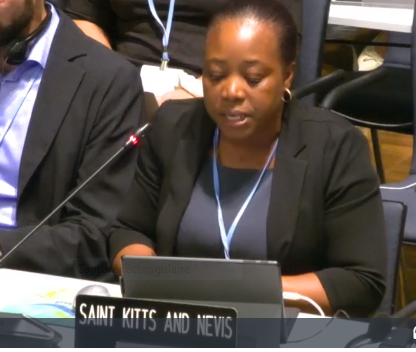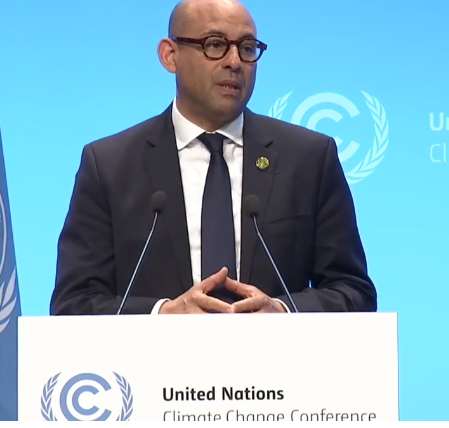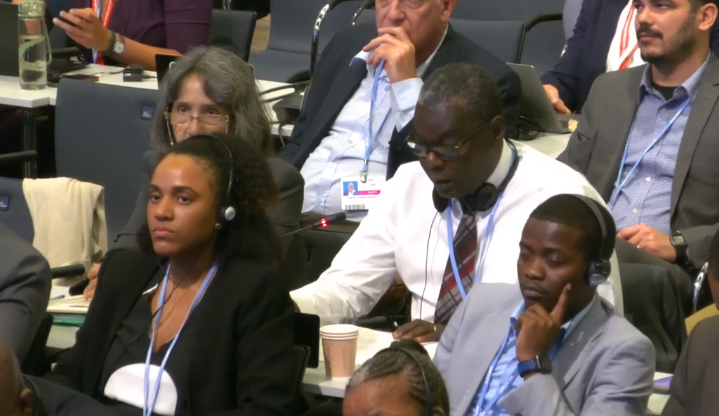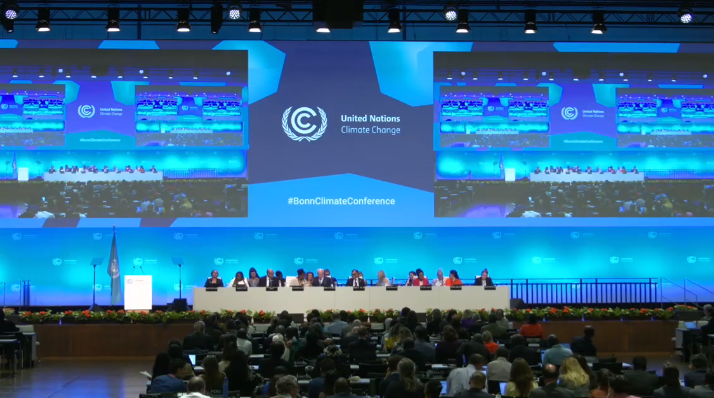Observers predicted this. The annual technical session in Bonn, the 58 Subsidiary Body sessions (SB58), proved to be complicated. To them, these negotiations were the scene of contradictions and disappointments, leaving room for multiple questions. Explanations.
By Houmi Ahamed-Mikidache
Two weeks of negotiations with many inconveniences for delegates and observers. Sexual harassment even interfered with the meetings. At the closing plenary, Simon Stiel, Executive Secretary of the United Nations Framework Convention on Climate Change (UNFCCC), even took offence to this, reminding delegates of the need to respect each other and asking for an apology from the victims. A code of conduct should soon be established within the Convention. Interventions, objections, approvals, clarifications and other protocols were completed at 11:40 pm local time.
For recognition of the IPCC

The meeting opened with powerful testimony. The Islands of Saint Kitts and Nevis, on behalf of the Small Island Developing States (SIDS) group, with 44 members who share a common vulnerability to the impacts of climate change, including sea-level rise leading to the disappearance of several islands, At the outset, they express their dissatisfaction and concern with the negotiating texts. For the first time, notes the SIDS representative, “the negotiating texts do not mention the results of the Intergovernmental Panel on Climate Change (IPCC) report. The process here must be based on the latest and best available science. The IPCC report is the most comprehensive and robust assessment we have on climate change, and we need to act on its message to bring global warming to 1.5 Celcius. It is a matter of survival for SIDS,’ said the representative of the Caribbean islands of Saint Kitts and Nevis. Several groups of countries in turn share the same point of view. The European Union, the Environmental Integrity Group ( EIG), comprising five countries Switzerland, Mexico and South Korea, Monaco and Liechtenstein, followed by Canada, Norway, the United States, New Zealand, Australia, and Senegal unanimously stressed the importance of the 6th IPCC report. ‘This is the most comprehensive and robust assessment of the scientific knowledge we have,’ repeats the EU representative.
Yet, despite approving the results of the latest IPCC report, the representatives of developed countries have, according to civil society, blocked the negotiation process during these two weeks, by refusing their responsibility for financing, and financing in particular for adaptation and technology transfer. The United States alone plans to increase fossil fuel production by more than 300 per cent, even though it has always been responsible for 23 per cent of emissions from 1859 to 2019, representing only 4 per cent of the world’s population. As we travel to Dubai for COP28 in November, there is increasing uncertainty about climate talks to find real solutions, real financing and concrete actions to reduce global emissions that can help the world move towards a just transition”, exposes a few hours before the close of negotiations the Global Campaign to Demand Climate Justice (DCJ), a network of more than 200 networks and organizations working globally, regionally and locally on climate justice.
“We have a commitment and we must keep it”

The more or less chaotic situation of the negotiations is not ignored by Simon Stiel, the Executive Secretary of the Convention. Speaking at the beginning of the evening, as usual in plenary sessions, he urged delegates to take direct action. “We have a commitment and we must keep it. The credibility of this process is threatened. Let’s not forget that there is no other place to find the solution: we will simply fail if we do not change the finance conversation at any time between now and the COP,” urges Simon Stiel, .
“Countries have not made much progress on the Global Adaptation Goal, leaving much to be discussed at the workshops before COP28. It is essential that countries agree on an ambitious set of targets for adaptation measures, and funding must be much more accessible so that the root causes of climate vulnerability can be addressed head-on,”described David Waskow, in a statement at the end of the negotiations in Bonn. David Waskow is the International Climate Director at the Global Resources Institute, a global research organisation working with civil society and governments.
Other obstacles identified in Bonn. According to a study entitled “HOLLOW COMMITMENTS 2023: an analysis of developed countries’ climate finance plans”, published on Thursday 14 June by the NGO Care, the financial commitment for adaptation, by rich countries whose France is insufficient. Only $14.3 billion per year is earmarked for adaptation funding. The promise of $100 billion a year by 2020, of which $50 billion is for adaptation, has not been honoured by developed countries. Only 10 out of 26 contributing countries include adaptation in their submission: Canada, Denmark, France, Japan, the Netherlands, New Zealand, Norway, the United States, the United Kingdom and the European Commission.
“Adaptation will account for less than half of their total climate finance”
Three major contributors have given up on achieving a mitigation/adaptation balance: France, Japan and the United States. These countries, according to Care, have indicated that adaptation will account for less than half of their total climate funding, which will compromise the achievement of a balance, the study finds. In Bonn, at the closing, the developing countries insist on the historical responsibility of developed countries on the causes of climate change a historical responsibility, which according to them is ignored. Developing countries are facing a reverse attitude.
‘We insist on our opening statement. The multilateral system on climate change is based on the UNFCCC, its Kyoto Protocol and the Paris Agreement. However, we have seen in these negotiations (SBs) continual attempts by developed partner countries to renegotiate the existing binding climate regime, neglecting fundamental principles such as the CBDR ( Common but Differentiated Responsibilities), equity and existing commitments, especially on means of implementation,’ states Cuba’s negotiator.
Made up of 133 developing countries and China, the 77+China Group represents 85% of the world’s population. Speaking a second time, the European Union welcomes the collaboration between developed and developing countries on the upcoming mitigation programme, but puts a couple of double-edged lines in the text. Divisive stories are a zero-sum game. We have not been able to have an official space in this session to address mitigation measures at a time when transformative measures are essential,’ explains Sweden’s representative for the EU of 27 countries.
Can hope be reborn?
Several contradictory speeches face in the closing plenary. The chair of the SB58 technical session, Nabeel Munir, Ambassador of Pakistan, feels compelled to intervene. “Let’s work to rebuild trust. Let’s start talking ito each other instead of talking at each other. Let’s understand that negotiation is a way to an end,” wants to reassure the co-chair of the SB58 technical session, from Pakistan, President of the G77+China at COP 27. Pakistan suffered many floods last year and the country, under the chairmanship of the 77+ China group, fought at COP 27 with other developing country negotiating groups for the inclusion in the texts of the establishment of a fund for losses and damages. A historic decision adopted.
In its speech, presented by Cuba, the Group 77 plus China points out the slowness of the process in the response on the implementation of loss and damage financing. We still lack the ambition and compromise needed by developed countries to achieve balanced progress on all issues, in particular with regard to means of implementation and loss and damage on issues crucial to developing countries on the basis of the sub-region’s research,’ says Cuba’s representative for the G77+China. Several groups of developing countries such as the Africa Group and the LDCs group align themselves throughout the evening with the positions of the 77+China group. The plenary session ends at 11:40 pm with disappointment.

For some observers, however, some negotiating points seem to have been achieved. The head of COP28, Ahmed Abdul Jaber, President of the United Arab Emirates, and the oil company Abu Dhabi Oil National Company briefly attended the conference in Bonn and he admitted that a gradual reduction in fossil fuels is now “inevitable”. What does that mean? What efforts will be presented at the COP 28 ?
For David Waskow, “the global stocktake officially moves from the technical to the political phase, but the slow process raises questions.” Discussions on the first-ever global stocktake have stalled on how to integrate funding and support. This adds another obstacle to harnessing the global balance sheet to mobilize COP28’s transformative actions to reduce emissions, build resilience and provide more finance,” he said in his statement. What it is the origin of the Global Stock Stake and what is about? As part of the Paris Agreement, concluded at COP 21 in 2015, the Global Stocktake assesses the efforts of states, communities and companies to reduce greenhouse gas emissions, enhance funding and enable countries to adapt to climate change.

Trust seems lost, but can hope be restored? “Although the talks in Bonn have been difficult, there are many opportunities in the coming months to give impetus to COP28. The Summit on a New Global Financial Compact to be held next week ( in Paris) is an opportunity to bring out new ideas for overcoming the difficult financial challenges facing developing countries. The International Maritime Organization has an opportunity to adopt carbon charges that can be used to finance climate. The UN Secretary-General’s Climate Ambition Summit in September will be an important opportunity for countries, businesses and financial institutions to table commitments that support the goals of the Global Stocktake. And negotiators will have a number of workshops to make discrete but crucial progress before the COP28 Summit in Dubai,’ said the Director of the World Resources Institute. COP 28 will take place in Dubai from 30 November to 12 December 2023.




